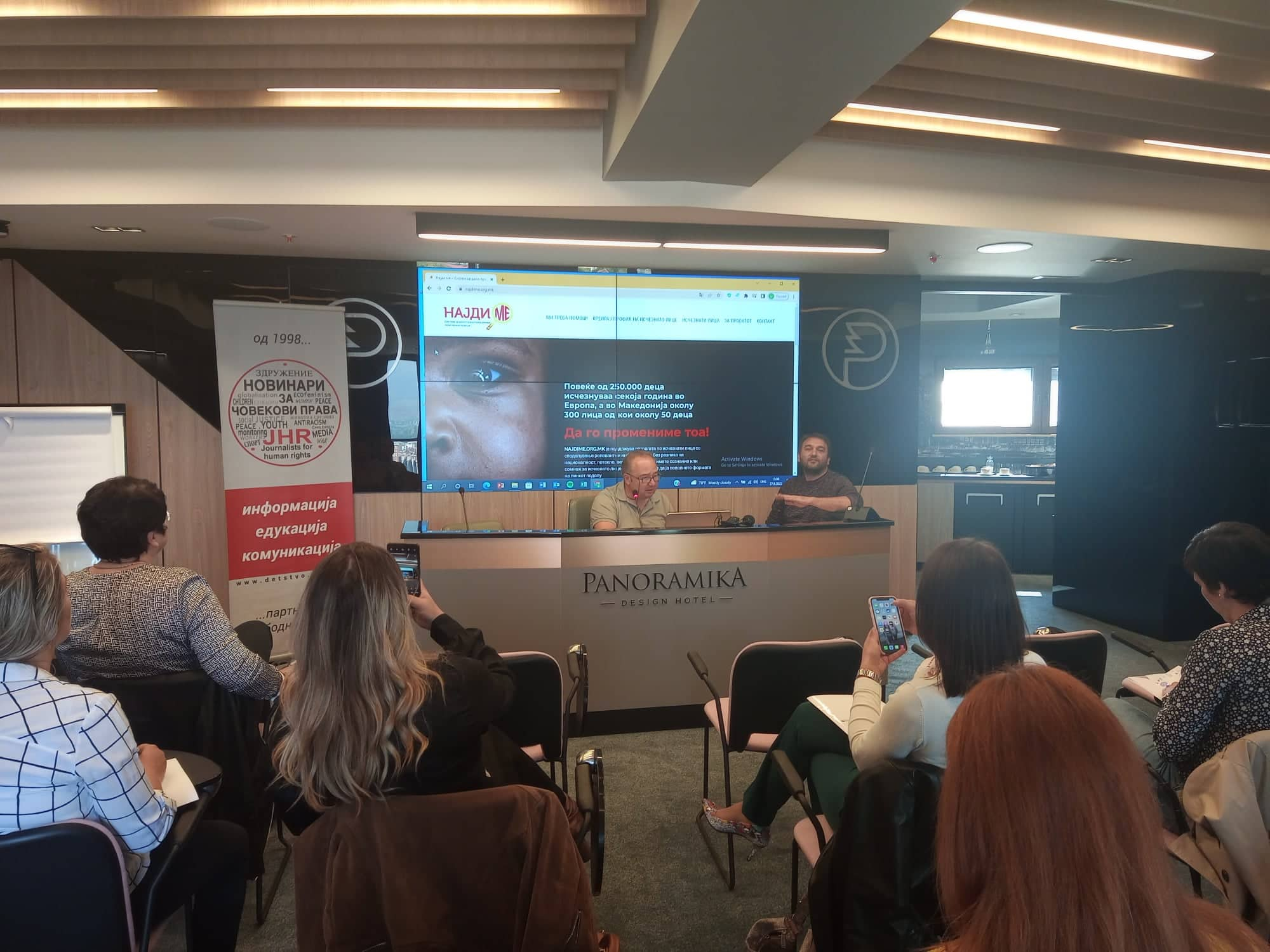Кога се работи за безбедноста на децата, статистиките не се важни бидејќи и едно исчезнато дете е премногу! Ова е ставот со кој се согласија сите учесници на дводневната работилница за имплементација на систем за рано предупредување за исчезнати деца која се одржа на 26 и 27 септември во Скопје во организација на НВО Новинари за човекови права како дел од проектот „Пилот проект за систем за рано предупредување за исчезнати деца.
Експертските искуства од борбата против трговијата со луѓе и потрагата по исчезнати лица, како и неопходните услови и предизвици за успешно имплементирање на системот за рано предупредување за исчезнатите деца, ги споделија Лили Шипец, виш стратешки советник во Амбер Алерт Европа и Кристијан Мадер, претседател на „Австрија ќе те најде“ (Österreich findet euch), како и Сашко Сирачевски и Билјана Лалова, главни инспектори во Националната единица за сузбивање на криумчарење мигранти и трговија со луѓе при Одделот за криминалистички истраги при Одделот за сузбивање на организиран и сериозен криминал и Баже Димитриовски, главен инспектор во Единицата за имотен и насилен криминал, Оддел на криминалистичка полиција при Министерството за внатрешни работи на Република Северна Македонија.
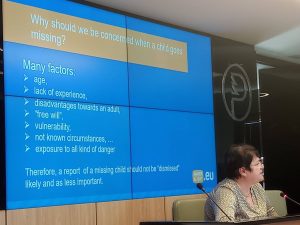 Цитирајќи статистички податоци за киднапираните деца во Европа, Лили Шипец од Амбер Алерт Европа рече: „Секоја година во Европа 600.000 луѓе исчезнуваат. Половина од нив се деца – 300.000… Статистиката за киднапираните деца покажува дека во 76% од случаите на киднапирање каде што дете било пронајдено убиено, детето било убиено во рок од 3 часа“. Затоа, како што се согласија учесниците, кога детето исчезнува, постои итна потреба да се дејствува, наместо да се чека 24-48 часа за да се поднесе полициска пријава за исчезнато лице, а во меѓувреме може да се решат сите прашања за можните причини.
Цитирајќи статистички податоци за киднапираните деца во Европа, Лили Шипец од Амбер Алерт Европа рече: „Секоја година во Европа 600.000 луѓе исчезнуваат. Половина од нив се деца – 300.000… Статистиката за киднапираните деца покажува дека во 76% од случаите на киднапирање каде што дете било пронајдено убиено, детето било убиено во рок од 3 часа“. Затоа, како што се согласија учесниците, кога детето исчезнува, постои итна потреба да се дејствува, наместо да се чека 24-48 часа за да се поднесе полициска пријава за исчезнато лице, а во меѓувреме може да се решат сите прашања за можните причини.
Она што беше нагласено од Кристијан Мадер од „Австрија ќе те најде“ и потврдено од учесниците дека функционира во пракса, е дека заедничките напори на граѓанското општество, медиумите и полициските службеници играат клучна улога во успешниот исход во повеќето случаи на исчезнати деца, така што доброто вмрежување и размената на информации е од клучно значење за воспоставување на систем за предупредување, по можност предводен од полициски службеници, но исто така може да е управуван и од невладини организации како што е во Австрија.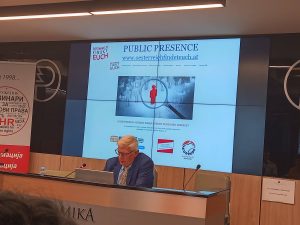
Соработката со медиумите беше посочена како многу важна во даде случаи за брзо ширење на информациите за исчезнатите,особено ако се користат дигитални рекламни површини на јавни простори, но и поддршката од невладиниот сектор. Како што посочи Сашко Сирачевски од МВР, презентирајќи случаи на обид за тргување со деца, многу е важна соработката со невладините организации бидејќи се работи за чувствителна тема во која „мора да има мултидисцилинарен пристап и многу е важно да не се скине алката за да не дојде до тргување со жртвата“.
Образложувајќи ја процедурата кога се работи за малолетници кои бегаат од дома или од воспитните домови за деца и млади, Баже Димитриовски од МВР потенцираше дека најважно е да се поднесе писмена пријава од родител, старател и установата која е законски застапник, бидејќи итноста на постапката е во интерес на детето, а подоцна може да се истражат причините за исчезнувањето кое многу често може да не биде своеволно. За ваквите постапки во кои нема кривично дело па е отежната процедурата 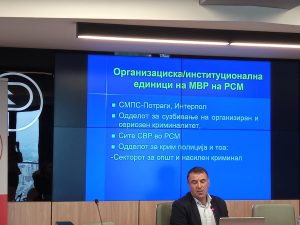 за предистражна постапка, како што посочи Билјана Лалова од МВР, треба да се работи со обвинителството за да се смени и олесни постапката. Таа ги посочи присилните бракови како тренд во трговијата со деца посебно во одредени етнички заедници, а во еден неодамнешен пример токму пријава од граѓанин и соработката со невладиниот сектор довела до спречување на обидот и ослободување на малолетничката од синиџирот на трговија со деца, по што таа била згрижена од надлежните институции и се чувствува добро.
за предистражна постапка, како што посочи Билјана Лалова од МВР, треба да се работи со обвинителството за да се смени и олесни постапката. Таа ги посочи присилните бракови како тренд во трговијата со деца посебно во одредени етнички заедници, а во еден неодамнешен пример токму пријава од граѓанин и соработката со невладиниот сектор довела до спречување на обидот и ослободување на малолетничката од синиџирот на трговија со деца, по што таа била згрижена од надлежните институции и се чувствува добро.
Според учесниците, сериозен проблем е и немањето регистар на „фантом лицата“, односно децата без матични броеви, за кои е тешко да се води евиденција дали исчезнале или само заминале. Дека не треба да постои разлика меѓу исчезнувања кај ранливите групи и високо профилираните случаи како киднапирање и барање откуп и дека медиумскиот интерес е понекогаш штетен, беше заеднички заклучок на присутните. Како што беше посочено, во случаи на киднапирање и барање откуп, семејството сепак треба да ја остави работата на полицијата, а не да презема своеволно други активности како плаѓање на откупот или известување на медиумите, бидејќи со тоа ја загрозува постапката за истрага и успешното ослободување на детето. Но, и кога се работи за случаи кои немаат резултат во краток рок, и кога исходот од потрагата по исчезнатото дете е неповолен, сепак важно е да има некаков епилог, со што и семејството има некаква разрешница во неизвесноста.
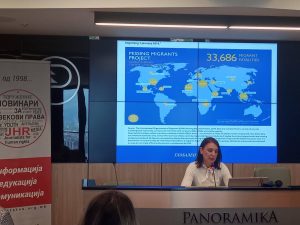 Вмрежувањето на разните чинители (НВО, институции, медиуми), споделувањето на податоци, макар и небитни и проактивноста на граѓаните, но и зајакнување на капацитетите како финансиски така и преку тренинзи, размена на искуства, превентивни кампањи, различни пристапи прилагодени на условите во секоја држава се она што го прави системот за алармирање за исчезнати деца универзална алатка која може да биде од корист во брзо безбедно лоцирање на децата, и на оние кои исчезнале и на оние кои заминале сами, бидејќи и кај нив постојат ризици по живот кои можеби на прв поглед не се очигледни.
Вмрежувањето на разните чинители (НВО, институции, медиуми), споделувањето на податоци, макар и небитни и проактивноста на граѓаните, но и зајакнување на капацитетите како финансиски така и преку тренинзи, размена на искуства, превентивни кампањи, различни пристапи прилагодени на условите во секоја држава се она што го прави системот за алармирање за исчезнати деца универзална алатка која може да биде од корист во брзо безбедно лоцирање на децата, и на оние кои исчезнале и на оние кои заминале сами, бидејќи и кај нив постојат ризици по живот кои можеби на прв поглед не се очигледни.
Тренингот е дел од низата активности за размена на искуства и стекнување нови знаења на сите вклучени страни (јавниот и приватниот сектор, граѓанските организации, медиумите) во проектот чија цел е да ги подобри постојните пристапи и да најде нови методи за превенција, истрага и ублажување на трговијата со луѓе и деца, како и заштита или зајакнување на правата на засегнатите лица.
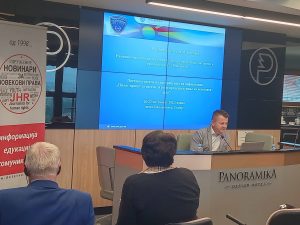 За таа цел беа спроведени повеќе активности меѓу кои и еднодневна обука за зајакнување на капацитетот на институциите за идентификување и насочување на клучните иновативни техники за спречување на трговијата со луѓе (транспозиција на европското законодавство, политики за управување – безбедност на лични податоци, итн.), еднодневна обука за новинари кои ги покриваат социјалните права, еднодневна обука за зајакнување на капацитетите на целните граѓански организации, студиски посети во Австрија за размена на добри практики за стручен кадар од релевантни државни институции и за претставници на НВО и новинари, беше изработена политика за заштита на децата, како и пакет со алатки за онлајн безбедност.
За таа цел беа спроведени повеќе активности меѓу кои и еднодневна обука за зајакнување на капацитетот на институциите за идентификување и насочување на клучните иновативни техники за спречување на трговијата со луѓе (транспозиција на европското законодавство, политики за управување – безбедност на лични податоци, итн.), еднодневна обука за новинари кои ги покриваат социјалните права, еднодневна обука за зајакнување на капацитетите на целните граѓански организации, студиски посети во Австрија за размена на добри практики за стручен кадар од релевантни државни институции и за претставници на НВО и новинари, беше изработена политика за заштита на децата, како и пакет со алатки за онлајн безбедност.
Проектот кој започна во јули 2021 година, а ќе трае до декември 2022 година, се спроведува во соработка со партнер организацијата ЕКПАТ-Австрија, и со финансиска поддршка од Федералното министерство за социјални работи, здравство, грижа и заштита на потрошувачите, а предвидува уште низа активности кои ќе се заокружат со пилотирање на Систем за рано предупредување за исчезнати деца.

